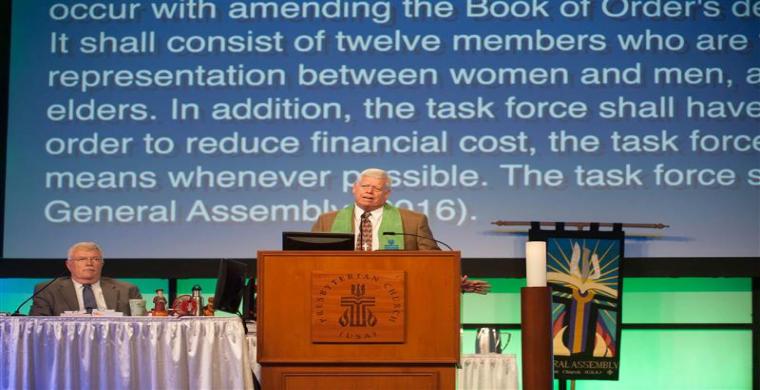Presbyterians vote to allow gay marriage by whopping 3-1 margin
By Lauren Markoe
RELIGION NEWS SERVICE
un 19, 2014
The Presbyterian Church (USA) voted Thursday (June 19) to allow gay and lesbian weddings within the church, making it among the largest Christian denominations to take an embracing step toward same-sex marriage.
By a 76-24 percent vote, the General Assembly of the 1.8 million-member PC(USA) voted to allow pastors to perform gay marriages in states where they are legal. Delegates, meeting in Detroit this week, also approved new language about marriage in the church’s Book of Order, or constitution, altering references to “a man and woman” to “two persons.”
This change will not become church law until a majority of the 172 regional presbyteries vote to ratify the new language. But given the lopsided 3-1 margin of the vote, approval is expected.
Gay rights activists within the church rejoiced at their victory, which was remarkable for its margin of victory after multiple years of razor-thin defeats.
“This vote is an answer to many prayers for the church to recognize love between committed same-sex couples,” said Alex McNeill, executive director of More Light Presbyterians, a group which has led the fight for gay marriage within the church.
The vote came after an emotional but polite debate in which opponents of the motion said it conflicted with Scripture, and would cause Presbyterian churches abroad to break relations with the PC(USA).
The Presbyterian Lay Committee, which opposes gay marriage, urged congregations to launch a financial boycott out of protest.
“The Presbyterian Lay Committee mourns these actions and calls on all Presbyterians to resist and protest them,” the group said in a statement. ” … You should refuse to fund the General Assembly, your synod, your presbytery and even your local church if those bodies have not explicitly and publicly repudiated these unbiblical actions.”
“God will not be mocked,” the statement continued, “and those who substitute their own felt desires for God’s unchangeable Truth will not be found guiltless before a holy God.”
Under the new rules, pastors who do not want to preside over gay weddings are not obligated to, and it applies only in the 19 states and the District of Columbia where same-sex civil marriage is legal.
The church has long grappled with the issue, which came to a head at the last General Assembly in 2012, when a similar resolution allowing for gay marriage lost 338-308. Since then, the church’s decades-long decline in membership has continued, losing about 5 percent of its membership in both 2012 and 2013. The loss was led by conservative-leaning congregations that defected over what they lamented as the church’s embrace of more liberal values.
But some who voted in favor of the gay marriage resolution said they hoped it would draw people to the church.
“I fear that our church brand is in jeopardy,” said public relations professional Margaret Blankers to the General Assembly. “Some question the relevance of church they see is not living up to its reputation for fairness. Do we really want to be known for not accepting and embracing our LGBT brothers and sisters?”
Those defections — many to smaller and more conservative Presbyterian denominations — made it more likely that the General Assembly would approve a gay marriage resolution this year.
The General Assembly’s vote reflects change in the nation, where in rapid succession during the past year, judges have struck down laws prohibiting same-sex marriage. And a steady stream of opinion polls show Americans’ approval of gay marriage has risen dramatically in the past few years, to around 55 percent today.
But even against this backdrop, the General Assembly’s vote stands out as a church adapting its policy to fit a rapidly shifting culture even as most other Christian denominations have resisted.
The nation’s largest churches — Roman Catholics, Southerns Baptist, Mormon, United Methodist and most evangelical churches — recognize marriage only as between a man and a woman, though many Methodists are pushing for a change. The Episcopal Church, the Evangelical Lutheran Church in America and the United Church of Christ all allow same-sex marriage.
END














